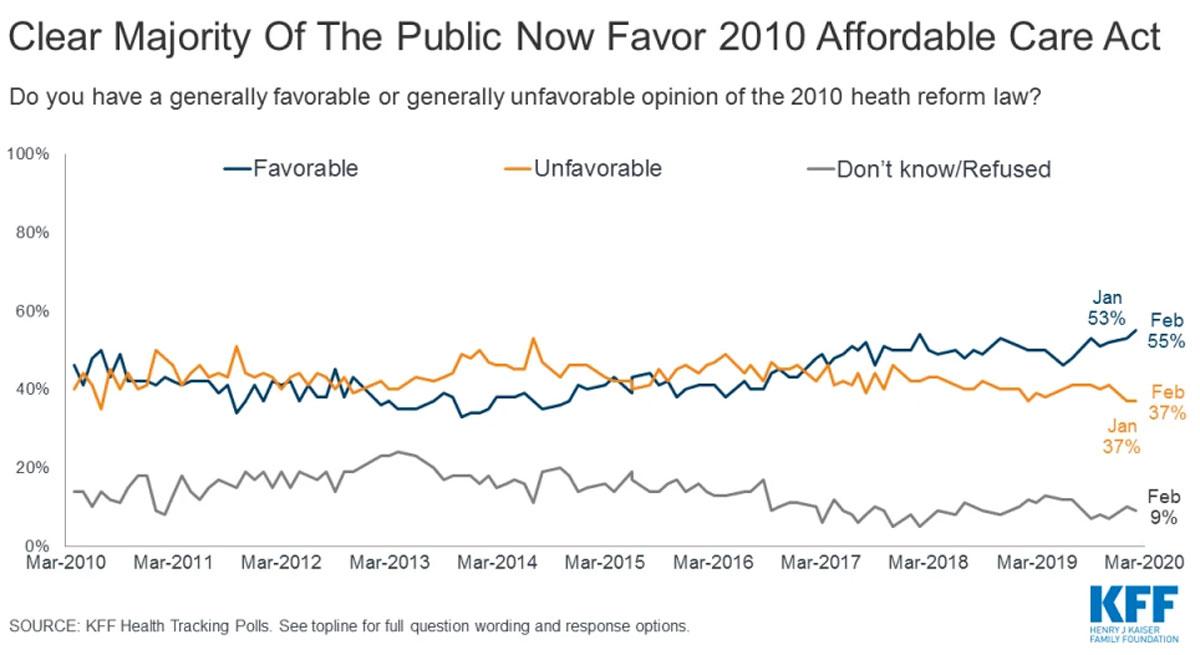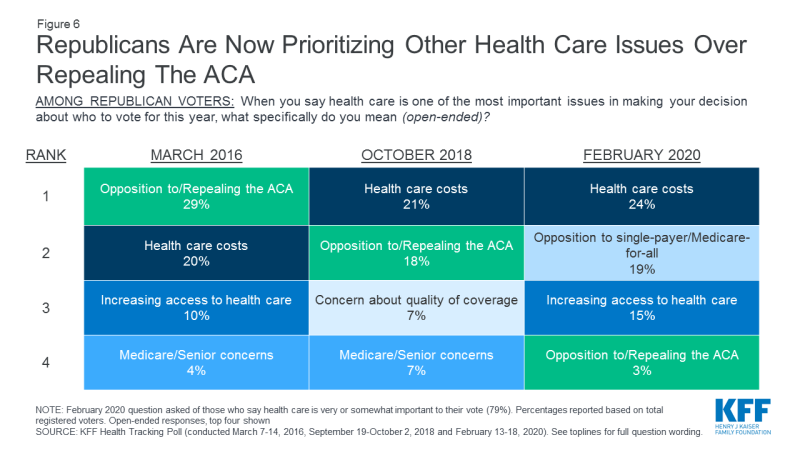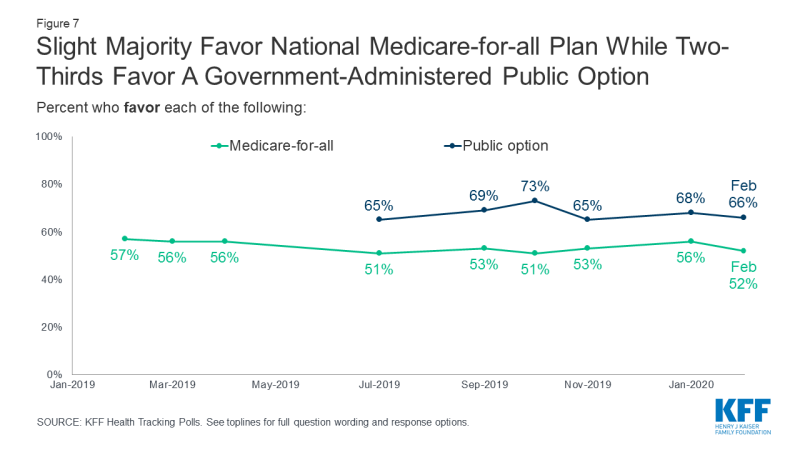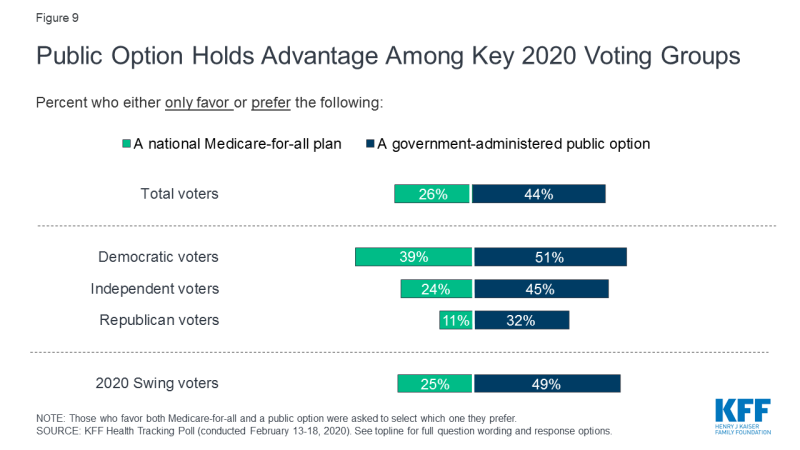KFF Health Tracking Poll – February 2020: Health Care in the 2020 Election As SCOTUS decides (this last Friday) whether it will take up he ACA and its constitutionality in Texas v. United States challenging the constitutionality of the 2010 Affordable Care Act (ACA), theattitude of the public towards it has changed since the 2016 election. The February 2020 KFF Health Tracking Poll finds attitudes towards the ACA hit its highest favorability rating since KFF began tracking opinions ~ ten years ago. The poll finds a clear majority of the public viewing the law favorably (55%), while slightly more than one-third (37%) of the public hold unfavorable views. In my own opinion, much of this change in attitude is the result of the rising patient costs of
Topics:
run75441 considers the following as important: Healthcare, politics
This could be interesting, too:
Robert Skidelsky writes Lord Skidelsky to ask His Majesty’s Government what is their policy with regard to the Ukraine war following the new policy of the government of the United States of America.
Joel Eissenberg writes No Invading Allies Act
Ken Melvin writes A Developed Taste
Bill Haskell writes The North American Automobile Industry Waits for Trump and the Gov. to Act
KFF Health Tracking Poll – February 2020: Health Care in the 2020 Election
As SCOTUS decides (this last Friday) whether it will take up he ACA and its constitutionality in Texas v. United States challenging the constitutionality of the 2010 Affordable Care Act (ACA), the attitude of the public towards it has changed since the 2016 election. The February 2020 KFF Health Tracking Poll finds attitudes towards the ACA hit its highest favorability rating since KFF began tracking opinions ~ ten years ago. The poll finds a clear majority of the public viewing the law favorably (55%), while slightly more than one-third (37%) of the public hold unfavorable views. In my own opinion, much of this change in attitude is the result of the rising patient costs of healthcare due to pricing increases, increased commercial healthcare costs, and the elimination of the CSR subsidies which also impacted people above 400% FPL in income causing many of them to drop healthcare insurance.
attitude of the public towards it has changed since the 2016 election. The February 2020 KFF Health Tracking Poll finds attitudes towards the ACA hit its highest favorability rating since KFF began tracking opinions ~ ten years ago. The poll finds a clear majority of the public viewing the law favorably (55%), while slightly more than one-third (37%) of the public hold unfavorable views. In my own opinion, much of this change in attitude is the result of the rising patient costs of healthcare due to pricing increases, increased commercial healthcare costs, and the elimination of the CSR subsidies which also impacted people above 400% FPL in income causing many of them to drop healthcare insurance.
Attitudes amongst Republicans have also changed (chart to the left) from 2016 t0 2020 with a greater priority being given to lowering healthcare cost over repealing the ACA. Most Republican voters (84%) hold unfavorable views towards the ACA; however, few offer up the ACA when asked to describe in their own words what about health care is important to their vote. Three percent of Republican voters offer opposition to or repealing the ACA as their top health care issue down from 2016. Twenty-four percent now list healthcare costs as their number one issue.
Attitudes amongst all voters towards the Affordable Care Act during the 2020 presidential election is quite different than how it was in 2016. As always click on the graph to enlarge. Beyond the leap, what is favored.
 Part of the 2020 Democratic presidential campaign includes major health policy stories detailing the divide between the top candidates on proposals to expand the public health insurance program in this country. Tracking by KFF covered both a national health plan or a Medicare-for-All and depict incremental changes to healthcare plans to include a government-administered health plan or a government-administered Public Option. Depicted in the graph to the left, fifty-two percent of the public favor a Medicare-for-All plan in which all Americans would get their insurance from a single government plan. A greater percentage or 66% favor a Public Option that would compete with private health plans and be available to all Americans. Both would be government-administered.
Part of the 2020 Democratic presidential campaign includes major health policy stories detailing the divide between the top candidates on proposals to expand the public health insurance program in this country. Tracking by KFF covered both a national health plan or a Medicare-for-All and depict incremental changes to healthcare plans to include a government-administered health plan or a government-administered Public Option. Depicted in the graph to the left, fifty-two percent of the public favor a Medicare-for-All plan in which all Americans would get their insurance from a single government plan. A greater percentage or 66% favor a Public Option that would compete with private health plans and be available to all Americans. Both would be government-administered.
 While a government-administered Public Option has the edge (44%) over a government-administered Medicare-for-All plan among Democratic voters, independent voters, and Republican voters; a significant share of Democratic voters (39%) either-only favor or prefer a national government-administered Medicare-for-All plan.
While a government-administered Public Option has the edge (44%) over a government-administered Medicare-for-All plan among Democratic voters, independent voters, and Republican voters; a significant share of Democratic voters (39%) either-only favor or prefer a national government-administered Medicare-for-All plan.
 A government-administered Public Option also holds the advantage over a national government-administered Medicare-for-All plan among Democratic voters (51% v. 39%), independent voters (45% v. 24%), and swing voters (49% v. 25%). I believe Medicare-for-All is on the horizon and will be achieved in incremental steps. Rather than aggravate those who wish to keep their employer sponsored commercial healthcare plans in an attempt to force Medicare -for- All and lose a much – needed election win, the deeply political move would be to take on a government administrated Public Option plan using Medicare and VA pricing and allow time to take its toll on commercial healthcare insurance. Over time, the move can be made to a Single Payer healthcare plan which WILL cut costs if not left to ACOs (which Bernie’s plan uses) and big business.
A government-administered Public Option also holds the advantage over a national government-administered Medicare-for-All plan among Democratic voters (51% v. 39%), independent voters (45% v. 24%), and swing voters (49% v. 25%). I believe Medicare-for-All is on the horizon and will be achieved in incremental steps. Rather than aggravate those who wish to keep their employer sponsored commercial healthcare plans in an attempt to force Medicare -for- All and lose a much – needed election win, the deeply political move would be to take on a government administrated Public Option plan using Medicare and VA pricing and allow time to take its toll on commercial healthcare insurance. Over time, the move can be made to a Single Payer healthcare plan which WILL cut costs if not left to ACOs (which Bernie’s plan uses) and big business.
KFF Health Tracking Poll – February 2020: Health Care in the 2020 Election, KFF, Ashley Kirzinger, Audrey Kearney, Mollyann Brodie, February 21, 2019
